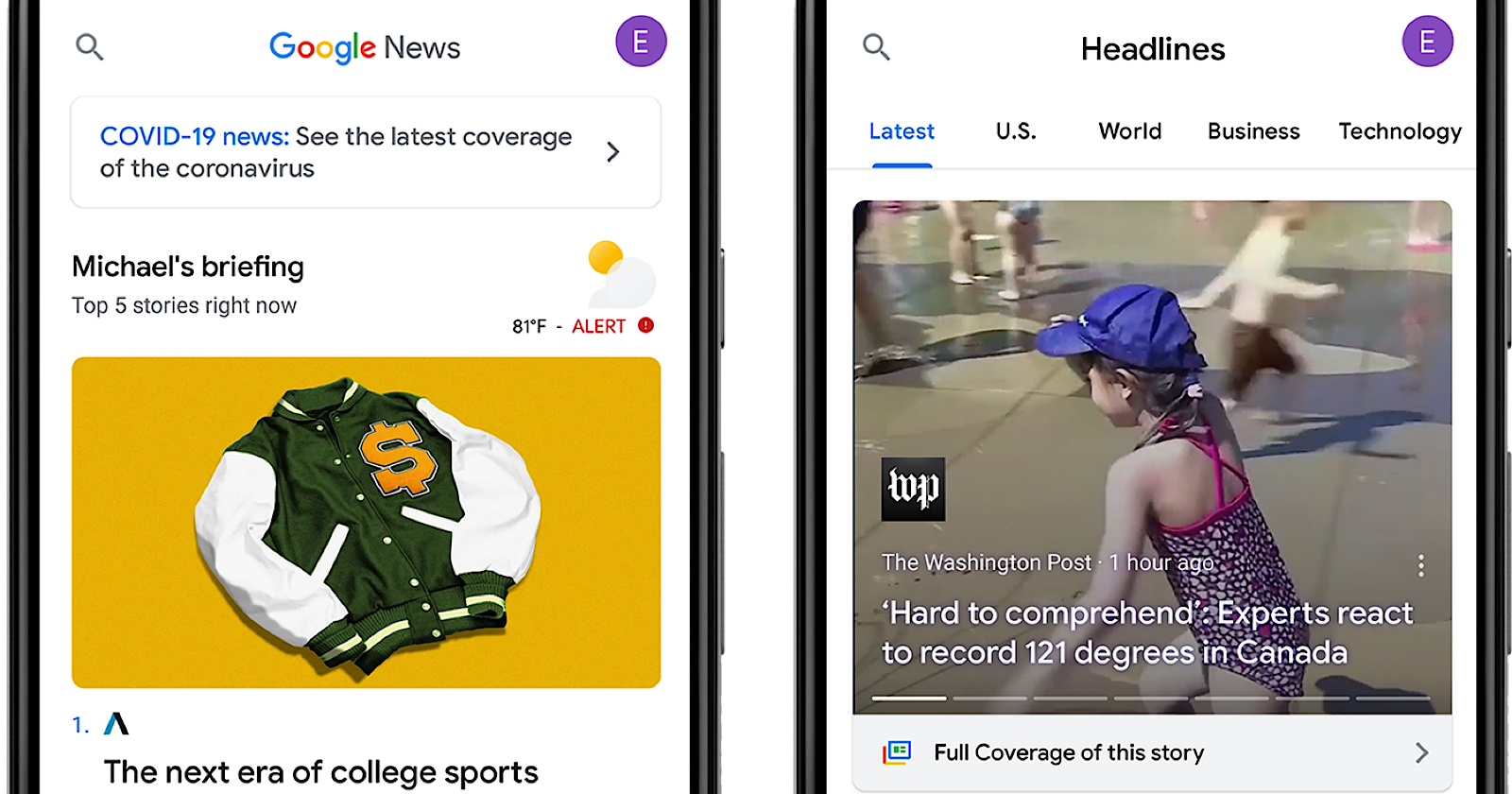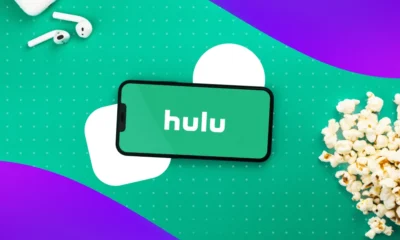Google Shares 5 Insights Into Appearing in Google News

Google shares five insights that can help site owners better understand how news appears on surfaces like Google News and Google Search.
In a new blog post, Google answers the following commonly asked questions about news content:
- Where does news appear on Google?
- Is my site eligible to appear in these places?
- How do I know if my site is appearing?
- Is there anything I can do to improve my visibility?
- I’m following Google’s advice. Why is my site still not appearing?
Here’s a quick summary of each answer.
Where Does News Appear On Google?
News content can appear on:
- Google News
- Google Search
- Google Assistant
- YouTube
- Discover
Google News, which can be accessed via the mobile app or on news.google.com, displays news in two ways.
The “For You” tab contains a feed of news stories based on a user’s interests, while the “Headlines” tab surfaces the same set of news stories for all users in a particular region.
In addition to showing links to news content in web results, Google Search surfaces news in the Top Stories carousel and the News tab.
Can My Site Appear Where Google Displays News?
Sites are automatically indexed in Google News if they meet the following criteria:
- Has high levels of expertise, authority, and trustworthiness.
- Has a consistent history of producing original news-related content.
- Complies with Google’s News policies.
Google previously required publishers to go through an application process to appear in Google News, but that was retired in 2019.
How Do I Know if My Site is Appearing in Google News?
The best way for site owners if their content is appearing in Google News is to look at the performance reports in Search Console.
Specifically, check the Google News report and the Google Search report (filtered to the News search type).
These reports indicate if a site is receiving traffic from Google News and news surfaces within Google Search.
Google notes that while the site: search query can be used on Google News or the News tab to see if pages are indexed, it doesn’t mean that those pages are eligible to appear for news searches.
Is There Anything I Can Do to Improve Visibility of News Content?
Once Google’s systems identify content that is eligible to appear in news surfaces, its ranking is determined automatically by a variety of factors, including:
- Relevance
- Prominence
- Authoritativeness
- Freshness
- Location
- Language
Google’s Publisher Center can be used to manage content that’s deemed eligible, but eligibility is determined through the automated process.
Site owners cannot use the Publisher Center to force content into Google News, for example.
I’m Following All This Advice, Why is My Site Not Appearing?
Google emphasizes the importance of regularly producing original news content that’s high in expertise and authoritativeness.
Following that advice should make a site eligible to appear on Google’s news surfaces.
Google notes that it’s systems run regularly and will recognize if a site has improved its content to better meet this criteria.
Source: Google Search Central Blog
AI
Exploring the Evolution of Language Translation: A Comparative Analysis of AI Chatbots and Google Translate

According to an article on PCMag, while Google Translate makes translating sentences into over 100 languages easy, regular users acknowledge that there’s still room for improvement.
In theory, large language models (LLMs) such as ChatGPT are expected to bring about a new era in language translation. These models consume vast amounts of text-based training data and real-time feedback from users worldwide, enabling them to quickly learn to generate coherent, human-like sentences in a wide range of languages.
However, despite the anticipation that ChatGPT would revolutionize translation, previous experiences have shown that such expectations are often inaccurate, posing challenges for translation accuracy. To put these claims to the test, PCMag conducted a blind test, asking fluent speakers of eight non-English languages to evaluate the translation results from various AI services.
The test compared ChatGPT (both the free and paid versions) to Google Translate, as well as to other competing chatbots such as Microsoft Copilot and Google Gemini. The evaluation involved comparing the translation quality for two test paragraphs across different languages, including Polish, French, Korean, Spanish, Arabic, Tagalog, and Amharic.
In the first test conducted in June 2023, participants consistently favored AI chatbots over Google Translate. ChatGPT, Google Bard (now Gemini), and Microsoft Bing outperformed Google Translate, with ChatGPT receiving the highest praise. ChatGPT demonstrated superior performance in converting colloquialisms, while Google Translate often provided literal translations that lacked cultural nuance.
For instance, ChatGPT accurately translated colloquial expressions like “blow off steam,” whereas Google Translate produced more literal translations that failed to resonate across cultures. Participants appreciated ChatGPT’s ability to maintain consistent levels of formality and its consideration of gender options in translations.
The success of AI chatbots like ChatGPT can be attributed to reinforcement learning with human feedback (RLHF), which allows these models to learn from human preferences and produce culturally appropriate translations, particularly for non-native speakers. However, it’s essential to note that while AI chatbots outperformed Google Translate, they still had limitations and occasional inaccuracies.
In a subsequent test, PCMag evaluated different versions of ChatGPT, including the free and paid versions, as well as language-specific AI agents from OpenAI’s GPTStore. The paid version of ChatGPT, known as ChatGPT Plus, consistently delivered the best translations across various languages. However, Google Translate also showed improvement, performing surprisingly well compared to previous tests.
Overall, while ChatGPT Plus emerged as the preferred choice for translation, Google Translate demonstrated notable improvement, challenging the notion that AI chatbots are always superior to traditional translation tools.
Source: https://www.pcmag.com/articles/google-translate-vs-chatgpt-which-is-the-best-language-translator
Google Implements Stricter Guidelines for Mass Email Senders to Gmail Users

Beginning in April, Gmail senders bombarding users with unwanted mass emails will encounter a surge in message rejections unless they comply with the freshly minted Gmail email sender protocols, Google cautions.
Fresh Guidelines for Dispatching Mass Emails to Gmail Inboxes In an elucidative piece featured on Forbes, it was highlighted that novel regulations are being ushered in to shield Gmail users from the deluge of unsolicited mass emails. Initially, there were reports surfacing about certain marketers receiving error notifications pertaining to messages dispatched to Gmail accounts. Nonetheless, a Google representative clarified that these specific errors, denoted as 550-5.7.56, weren’t novel but rather stemmed from existing authentication prerequisites.
Moreover, Google has verified that commencing from April, they will initiate “the rejection of a portion of non-compliant email traffic, progressively escalating the rejection rate over time.” Google elaborates that, for instance, if 75% of the traffic adheres to the new email sender authentication criteria, then a portion of the remaining non-conforming 25% will face rejection. The exact proportion remains undisclosed. Google does assert that the implementation of the new regulations will be executed in a “step-by-step fashion.”
This cautious and methodical strategy seems to have already kicked off, with transient errors affecting a “fraction of their non-compliant email traffic” coming into play this month. Additionally, Google stipulates that bulk senders will be granted until June 1 to integrate “one-click unsubscribe” in all commercial or promotional correspondence.
Exclusively Personal Gmail Accounts Subject to Rejection These alterations exclusively affect bulk emails dispatched to personal Gmail accounts. Entities sending out mass emails, specifically those transmitting a minimum of 5,000 messages daily to Gmail accounts, will be mandated to authenticate outgoing emails and “refrain from dispatching unsolicited emails.” The 5,000 message threshold is tabulated based on emails transmitted from the same principal domain, irrespective of the employment of subdomains. Once the threshold is met, the domain is categorized as a permanent bulk sender.
These guidelines do not extend to communications directed at Google Workspace accounts, although all senders, including those utilizing Google Workspace, are required to adhere to the updated criteria.
Augmented Security and Enhanced Oversight for Gmail Users A Google spokesperson emphasized that these requisites are being rolled out to “fortify sender-side security and augment user control over inbox contents even further.” For the recipient, this translates to heightened trust in the authenticity of the email sender, thus mitigating the risk of falling prey to phishing attempts, a tactic frequently exploited by malevolent entities capitalizing on authentication vulnerabilities. “If anything,” the spokesperson concludes, “meeting these stipulations should facilitate senders in reaching their intended recipients more efficiently, with reduced risks of spoofing and hijacking by malicious actors.”
Google’s Next-Gen AI Chatbot, Gemini, Faces Delays: What to Expect When It Finally Launches

In an unexpected turn of events, Google has chosen to postpone the much-anticipated debut of its revolutionary generative AI model, Gemini. Initially poised to make waves this week, the unveiling has now been rescheduled for early next year, specifically in January.
Gemini is set to redefine the landscape of conversational AI, representing Google’s most potent endeavor in this domain to date. Positioned as a multimodal AI chatbot, Gemini boasts the capability to process diverse data types. This includes a unique proficiency in comprehending and generating text, images, and various content formats, even going so far as to create an entire website based on a combination of sketches and written descriptions.
Originally, Google had planned an elaborate series of launch events spanning California, New York, and Washington. Regrettably, these events have been canceled due to concerns about Gemini’s responsiveness to non-English prompts. According to anonymous sources cited by The Information, Google’s Chief Executive, Sundar Pichai, personally decided to postpone the launch, acknowledging the importance of global support as a key feature of Gemini’s capabilities.
Gemini is expected to surpass the renowned ChatGPT, powered by OpenAI’s GPT-4 model, and preliminary private tests have shown promising results. Fueled by significantly enhanced computing power, Gemini has outperformed GPT-4, particularly in FLOPS (Floating Point Operations Per Second), owing to its access to a multitude of high-end AI accelerators through the Google Cloud platform.
SemiAnalysis, a research firm affiliated with Substack Inc., expressed in an August blog post that Gemini appears poised to “blow OpenAI’s model out of the water.” The extensive compute power at Google’s disposal has evidently contributed to Gemini’s superior performance.
Google’s Vice President and Manager of Bard and Google Assistant, Sissie Hsiao, offered insights into Gemini’s capabilities, citing examples like generating novel images in response to specific requests, such as illustrating the steps to ice a three-layer cake.
While Google’s current generative AI offering, Bard, has showcased noteworthy accomplishments, it has struggled to achieve the same level of consumer awareness as ChatGPT. Gemini, with its unparalleled capabilities, is expected to be a game-changer, demonstrating impressive multimodal functionalities never seen before.
During the initial announcement at Google’s I/O developer conference in May, the company emphasized Gemini’s multimodal prowess and its developer-friendly nature. An application programming interface (API) is under development, allowing developers to seamlessly integrate Gemini into third-party applications.
As the world awaits the delayed unveiling of Gemini, the stakes are high, with Google aiming to revolutionize the AI landscape and solidify its position as a leader in generative artificial intelligence. The postponed launch only adds to the anticipation surrounding Gemini’s eventual debut in the coming year.
-

 MARKETING7 days ago
MARKETING7 days agoHow Tagging Strategies Transform Marketing Campaigns
-

 SEARCHENGINES6 days ago
SEARCHENGINES6 days agoThe Industry Mourns The Loss Of Mark Irvine
-

 MARKETING6 days ago
MARKETING6 days agoThe key to correcting the C-suite trust deficit
-

 AFFILIATE MARKETING7 days ago
AFFILIATE MARKETING7 days agoStay Focused and Accessible with These $40 Conduction Headphones
-

 MARKETING5 days ago
MARKETING5 days agoA Recap of Everything Marketers & Advertisers Need to Know
-

 SEO7 days ago
SEO7 days agoWhat Is Social Listening And How To Get Started
-

 SEO6 days ago
SEO6 days ago128 Top SEO Tools That Are 100% Free
-

 PPC3 days ago
PPC3 days agoHow the TikTok Algorithm Works in 2024 (+9 Ways to Go Viral)















